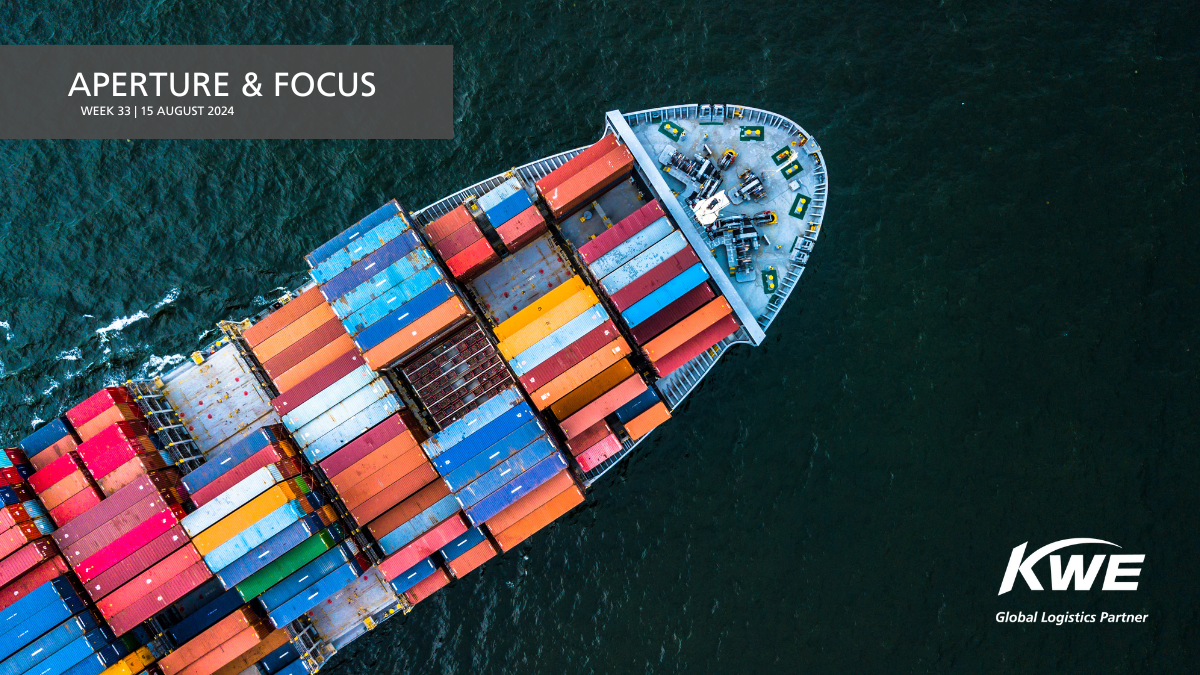Quote
Aperture & Focus 2024: Week 33

Global Aperture
Container shipping demand from China to North America and Northern Europe hit record highs in July. However, early signs suggest that volumes may be stabilizing, indicating a potential slowdown after a surge aimed at securing supply chains amid global instability.
Shippers are accelerating imports ahead of the winter peak shopping season due to anticipated new tariffs on Chinese goods, originally set to start on August 1st but delayed. This has led to a 4.5% increase in imports from China compared to last year and a shift towards U.S. West Coast ports, driven partly by concerns over a potential dockworker strike at East Coast and Gulf Coast ports, with contract talks expiring on September 30th.
Regional Focus
Americas
United States: The looming port strikes on the US east and Gulf coasts, set for October 1st if no agreement is reached, could exacerbate airfreight congestion, already strained by peak-season e-commerce demand. With shippers potentially shifting cargo to airfreight to avoid port delays, the added pressure from rising e-commerce volumes could lead to severe capacity shortages in the air cargo sector.
Canada: A rail strike could commence as early as August 22nd if Canadian National and Canadian Pacific Kansas City fail to reach an agreement with the Teamsters Canada Rail Conference, following a decision by the Canada Industrial Relations Board allowing for a work stoppage. The ongoing contract disputes, centered on crew scheduling, safety, and fatigue management, threaten to disrupt commuter operations and supply chains across Canada.
Asia-Pacific
Korea: On August 9th, Busan Port achieved a milestone by successfully demonstrating simultaneous liquefied natural gas bunkering and container handling for the liquefied natural gas-powered container ship Visby II. This advancement enhances Busan Port's competitiveness and positions it alongside global leaders, addressing the maritime industry's shift towards more sustainable practices amid tightening emission regulations.
China: On August 9th, an explosion involving hazardous materials aboard the Yang Ming vessel YM Mobility at Ningbo Beilun Phase III Terminal caused a 60-hour closure. While the terminal is now back in operation, the incident—along with prior disruptions from Typhoon Gaemi—is expected to lead to delays and container shortages. However, claims of severe global supply chain repercussions may be exaggerated; the primary impact will be on local delays.
India: Workers at major Indian ports are planning an indefinite strike starting August 28th, demanding immediate resolution of pay revisions and allowances, including pension benefits, following a long-delayed settlement process. The strike, driven by stalled negotiations and perceived centralization of port authority under the Ministry of Shipping, could severely impact supply chains by disrupting operations at key ports, leading to potential delays in imports and exports across the country.
Europe, Middle East & Africa
Italy: Italy's freight rail sector is facing a severe crisis due to ongoing infrastructure projects that are causing widespread rail line closures, cutting transport capacity by over 50% in 2024, with even more greater reductions during peak summer months. Key Alpine tunnels that are critical routes for Italy’s logistics network—are also closed, prompting major associations to call for government intervention to prevent further financial damage as the industry struggles with reduced rail freight traffic and continued disruptions.
Belgium: In July, Brussels Airport experienced a 6.1% year-on-year increase in overall air cargo volumes, recovering from a June decline, while Liege Airport continued its strong growth trend with a 17% rise in volumes, driven by e-commerce shipments and new airline partnerships— an increase that continues to outpace the European average of 9.6% throughout the first half of 2024.